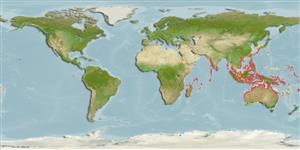Common names from other countries
Environment: milieu / climate zone / depth range / distribution range
Ecologia
marinhas associadas(os) a recifes; intervalo de profundidade 10 - 28 m (Ref. 9710). Tropical
Indo-West Pacific: East Africa to Fiji.
Tamanho / Peso / Idade
Maturity: Lm ? range ? - ? cm
Max length : 23.0 cm TL macho/indeterminado; (Ref. 2334); 23.0 cm NG (female)
Espinhos dorsais (total) : 5; Raios dorsais moles (total) : 21; Espinhos anais: 1; Raios anais moles: 17 - 18. Has a white mid-lateral stripe from the upper pectoral base to the tail. Males have narrow diagonal lines on the cheek. (Ref. 37816). Fine spotting over the back (Ref. 48636). Scales on back above white stripe with dark edges, many with outer half dark brown. An orange-yellow bar at base of pectoral fins (Ref 42740).
Found in shallow protected sandy areas near reefs of lagoons and bays to at least 28 m (Ref. 9710), often amongst boulders (Ref. 48636, 58652). Minimum depth of 10 m reported from Ref. 37816, 90102.
Life cycle and mating behavior
Maturities | Reprodução | Spawnings | Egg(s) | Fecundities | Larvas
Randall, J.E., G.R. Allen and R.C. Steene, 1990. Fishes of the Great Barrier Reef and Coral Sea. University of Hawaii Press, Honolulu, Hawaii. 506 p. (Ref. 2334)
Categoria na Lista Vermelha da IUCN (Ref. 130435)
CITES (Ref. 128078)
Not Evaluated
Ameaça para o homem
Harmless
Utilização humana
Pescarias: espécies comerciais; Aquário: Espécies comerciais
Ferramentas
Relatórios especiais
Descarregue XML
Fontes da internet
Estimates based on models
Preferred temperature (Ref.
115969): 24.7 - 29, mean 28 (based on 388 cells).
Phylogenetic diversity index (Ref.
82804): PD
50 = 0.5000 [Uniqueness, from 0.5 = low to 2.0 = high].
Bayesian length-weight: a=0.00676 (0.00386 - 0.01183), b=3.04 (2.89 - 3.19), in cm Total Length, based on LWR estimates for this species & Genus-body shape (Ref.
93245).
Nível Trófico (Ref.
69278): 3.6 ±0.4 se; based on size and trophs of closest relatives
Resiliência (Ref.
120179): Elevada, tempo mínimo de duplicação da população menor que 15 meses (Preliminary K or Fecundity.).
Fishing Vulnerability (Ref.
59153): Low vulnerability (13 of 100).
